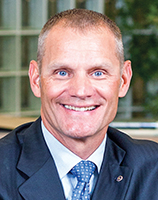Changing the Trajectory of Students’ Lives
September 01, 2016
Profile

In 2009, roughly 16 months after Steve Webb was promoted to the superintendency of Vancouver, Wash., Public Schools, two issues surfaced that, according to school board president Mark Stoker, presented “a make-or-break moment.”
The nearly 24,000-student district, located 10 miles north of Portland, Ore., faced more than $20 million in budgetary shortfalls, and two middle schools were ranked among the bottom 5 percent in the state.
“Leadership is about action,” Webb declared, as he mobilized the board’s support behind far-reaching initiatives. He redirected $2 million in funds annually to accelerate the community schools model in 16 Opportunity Zone schools that serve high-poverty
neighborhoods. He empowered staff at these schools to make strategic decisions to raise student achievement while holding them accountable for results.
As part of that effort, Webb presided over the opening of family community resource centers at each of the Opportunity Zone schools, including the two struggling middle schools. Full-time coordinators brokered services with community partners
to meet children’s basic needs — food, clothing, health care and housing.
Webb was able to move quickly because he had “led a strategic planning effort that was the most comprehensive I’d ever seen,” says David Christel, a federal magistrate judge and a former school board member. Based on discussions with hundreds
of stakeholders, Webb essentially reshaped the district from a suburban to urban school system, confronting his city’s changed social, economic and racial makeup.
Putting the school system as the lead entity for the family resource centers engaged community agencies in the lives of school families to new levels. The cross-sector approach was “transformational,” Webb says. Vancouver now counts as its partners
some 750 public and nonprofit groups.
“Dr. Webb insists on having metrics to measure success,” Christel says.
Consider these outcomes: In 2014, about two weeks before Christmas, dozens of families in a low-income apartment complex received notices to vacate. “Within a nine-day period, we raised nearly $100,000 to aid these families,” Webb says.
“That is the power of the ‘village’ to serve people in need.”
The district’s graduation rate topped 80 percent in 2015, up from 64 percent five years before. The gap between English language learners and other 3rd graders narrowed by nearly 20 percentage points in reading. Meanwhile, a disproportionate
percentage of students attending high-poverty schools began taking advanced coursework.
Proponents describe Webb as “remarkable,” “visionary,” “strategic” and “a person who empowers and motivates others.” His accomplishments also have put him and the district in the national spotlight. This year, Webb was a finalist for the National
Superintendent of the Year and a recipient of Education Week’s Leaders to Learn From award.
Webb is driven by his desire to alter the trajectories of students’ lives through quality education. That means removing barriers to learning.
He can speak from personal experience. As a high school junior, he assumed he was headed into the military because college was beyond the reach of his financially strapped family.
When his assistant principal, Jay Reifel, asked him about his plans, Webb shared his situation. Webb was astonished when Reifel suggested he commit to college and over the next year acted as a surrogate father, advising Webb on courses to take
and ensuring he completed the financial aid forms.
“Never underestimate the power of one transformative relationship to make the difference in the life of a child,” Webb tells his staff. “You are that powerful.”
Author
Bio Stats: Steve Webb
Currently: superintendent, Vancouver, Wash., Public Schools
Previously: deputy superintendent, Vancouver
Age: 53
Greatest influence on career: My doctoral studies of systems thinking, organizational development and leadership.
Best professional day: The first day of kindergarten and high school commencement. Parents don’t give us their students. They give us their children.
Books at bedside:Our Kids: The American Dream in Crisis by Robert Putnam
Biggest blooper: We had a snowstorm and every area school district closed except ours. To make matters worse, we decided to operate on time. I received quite a bit of constructive feedback from students, staff, parents and patrons.
Why I’m an AASA member: I value AASA’s professional learning networks, leadership development and public policy advocacy.
Advertisement
Advertisement
Advertisement
Advertisement




